Why Cortisol Control Is Key to Resilience: Mastering Stress to Build Emotional Strength
Introduction
We all experience stress — it’s unavoidable. Whether it’s a deadline, an argument, or uncertainty about the future, the body’s stress response is designed to protect us. But when stress becomes chronic, that protective system can turn against us.
At the center of it all lies a single molecule: cortisol.
Often called the “stress hormone”, cortisol helps us rise to challenges — but when left unchecked, it becomes one of the biggest barriers to resilience, recovery, and emotional balance.
Learning to regulate cortisol is not about eliminating stress altogether; it’s about teaching your body how to return to calm faster. In that balance lies true resilience — the ability to bend without breaking. 🌿
Let’s explore how cortisol works, what happens when it’s unbalanced, and the most effective ways to master it for long-term emotional and physical strength.
Looking for supplements for Resilience? Click here.
🧠 What Is Cortisol?
Cortisol is a glucocorticoid hormone produced by the adrenal glands — small organs that sit on top of your kidneys. It’s part of the body’s hypothalamic-pituitary-adrenal (HPA) axis, a powerful network that regulates your stress response, immune function, energy metabolism, and circadian rhythm.
When you face a stressor (like danger, conflict, or even strong emotion), your brain releases CRH (corticotropin-releasing hormone) → which triggers ACTH (adrenocorticotropic hormone) → which signals your adrenals to release cortisol.
Once the challenge passes, cortisol levels should drop, allowing your body to return to rest and repair.
But in the modern world, stress is rarely short-term. Constant notifications, financial pressure, emotional strain, and lack of recovery keep cortisol chronically elevated — and that’s where problems begin.
🌊 Cortisol’s Dual Nature: Friend and Foe
Cortisol itself isn’t bad — in fact, it’s essential for survival.
✅ In Balance, Cortisol Helps You:
Wake up and feel alert in the morning ☀️
React quickly to challenges ⚡
Regulate inflammation and immunity 🩸
Mobilize energy when needed 💪
❌ Out of Balance, Cortisol Can:
Cause fatigue and brain fog 😴
Disrupt sleep and mood 🌙
Impair memory and focus 🧠
Suppress immune function 🤒
Contribute to anxiety, depression, and burnout 😔
When cortisol stays high for too long, your body shifts from adaptation to depletion — draining the very reserves that resilience depends on.
🩸 The Cortisol–Resilience Connection

Resilience is the ability to adapt, recover, and grow stronger after stress. Biologically, that adaptability depends on a flexible stress system — one that activates when needed but also deactivates quickly.
Cortisol plays the starring role in that process.
🧩 When cortisol is balanced:
You handle stress effectively.
You recover faster.
You stay mentally sharp and emotionally grounded.
⚠️ When cortisol is chronically high or low:
You become reactive, anxious, or emotionally exhausted.
Small challenges feel overwhelming.
Your body remains in a constant “survival mode.”
In other words: resilience isn’t about avoiding stress — it’s about controlling the cortisol curve.
🧬 The Cortisol Curve: Your Daily Rhythm
Cortisol follows a natural circadian rhythm:
| Time of Day | Normal Cortisol Function |
|---|---|
| 6–8 AM | Peaks to wake you up and energize the body ☀️ |
| Midday | Gradually decreases as alertness stabilizes |
| Evening | Drops significantly to prepare for rest 🌙 |
| Night | Stays low for deep sleep and recovery 💤 |
When this rhythm is disrupted — for example, by late-night stress, caffeine, or blue light exposure — your body can’t recover properly, leading to fatigue and mood instability.
Balancing cortisol means restoring this natural rise and fall so your energy, focus, and emotions can flow in harmony.
💥 How Chronic Stress Disrupts Cortisol
Emotional Stress
Ongoing anxiety, grief, or unresolved trauma keeps the HPA axis overactive — your brain can’t tell the difference between a looming deadline and a tiger attack.
Sleep Deprivation
Poor sleep increases cortisol levels the next day, which in turn disrupts sleep again — creating a vicious cycle.
Blood Sugar Instability
Skipping meals or eating too much sugar spikes insulin, which triggers cortisol to stabilize blood sugar — straining the adrenals over time.
Caffeine Overuse
Caffeine raises cortisol temporarily. A cup or two can be fine, but excessive intake keeps your system in “on” mode, delaying recovery.
Sedentary Lifestyle or Overtraining
Too little movement reduces cortisol flexibility; too much exercise without recovery drives cortisol up.
Social Isolation and Loneliness
Human connection lowers cortisol through oxytocin release. Without it, the stress system remains elevated.
🔄 Cortisol, Emotions, and the Brain
Cortisol doesn’t just act on the body — it shapes emotion and thought through its influence on the brain.
🧠 The Amygdala
The amygdala detects threat and triggers the stress response. Chronic cortisol exposure enlarges it, making you hyper-reactive to stress.
💫 The Hippocampus
This brain region regulates memory and the shut-off signal for stress. High cortisol damages its neurons, leading to poor memory and slower recovery from anxiety.
🧭 The Prefrontal Cortex
Responsible for focus and decision-making, it’s weakened by chronic cortisol — leading to impulsivity, negative thinking, and emotional overwhelm.
Balanced cortisol = calm, focused thinking.
High cortisol = reactivity and fear.
💞 Cortisol and Emotional Resilience
Emotional resilience — the capacity to stay calm and bounce back — relies on cortisol flexibility.
When your cortisol levels rise in response to stress and then return to normal quickly, you feel emotionally agile.
But if they remain elevated, emotions get stuck. You might feel “on edge” or numb, unable to regulate properly.
Balanced cortisol means you can feel emotions fully without being consumed by them.
🌱 Signs of Cortisol Imbalance
🆙 High Cortisol Symptoms
Anxiety, panic, or irritability 😰
Weight gain (especially belly fat)
Racing thoughts or insomnia
Sugar or salt cravings
Frequent colds or fatigue
⬇️ Low Cortisol Symptoms
Morning exhaustion despite sleep
Low motivation or brain fog
Dizziness or low blood pressure
Craving stimulants (coffee, sugar)
Emotional flatness or apathy
In both cases, your resilience weakens because your body is out of sync with its natural stress rhythm.
🧘 The Physiology of Recovery: Calming Cortisol Naturally
True resilience comes from teaching your body that it’s safe again — that stress can rise, but calm will follow.
Here’s how to reset the cortisol system from chaos to harmony:
🌤️ Morning Sunlight Exposure
Sunlight is the natural trigger for your cortisol peak. Ten minutes of exposure in the first hour after waking helps align your circadian rhythm, boosting energy during the day and improving sleep at night.
☀️ Morning light = cortisol balance, not overstimulation.
🍽️ Balanced Blood Sugar
Fluctuating glucose = fluctuating cortisol.
Eat protein and fiber with every meal.
Avoid skipping meals or crash diets.
Choose complex carbs like oats, quinoa, and vegetables.
Steady energy keeps cortisol from spiking unnecessarily.
🧘 Breathwork and Meditation
Slow, rhythmic breathing directly lowers cortisol via the vagus nerve.
Try this:
Inhale for 4 seconds
Exhale for 6 seconds
Repeat for 3–5 minutes
This shifts your body from sympathetic (stress) to parasympathetic (calm) mode.
Breath is the remote control for your nervous system. 🌬️
Want to try Breathwork? Click Here.
💪 Regular Movement
Moderate exercise (like walking, yoga, swimming) helps regulate cortisol by improving HPA axis flexibility.
However, excessive high-intensity training without rest keeps cortisol high — especially if paired with poor sleep or nutrition.
🏃 Move daily, but recover deeply.
💤 Prioritize Sleep
Sleep is cortisol’s reset button.
Go to bed and wake up at consistent times.
Keep the room cool, dark, and quiet.
Avoid screens an hour before bed.
During deep sleep, cortisol drops and the body repairs. Chronic sleep deprivation, on the other hand, is a fast track to burnout. 🌙
💞 Social Connection
Positive social contact releases oxytocin, which counteracts cortisol’s effects. Hugs, laughter, and shared meals all send safety signals to the nervous system.
🤝 Connection is your natural cortisol regulator.
🌿 Adaptogenic Support
Adaptogens are herbs that help the body adapt to stress by regulating cortisol levels.
| Adaptogen | Key Benefit |
|---|---|
| Ashwagandha | Lowers cortisol and anxiety |
| Rhodiola Rosea | Enhances energy and stress tolerance |
| Holy Basil (Tulsi) | Stabilizes mood and adrenal health |
| Reishi Mushroom | Promotes calm and immune balance |
| Panax Ginseng | Reduces fatigue, improves focus |
These herbs gently modulate the HPA axis, supporting long-term resilience without overstimulation. 🌿
Looking for supplements for Resilience? Click here.
🍫 Magnesium and B Vitamins
Magnesium and B-complex vitamins are critical for adrenal health and cortisol regulation.
Magnesium glycinate calms the nervous system and supports sleep.
B5 and B6 aid cortisol metabolism.
🧠 Nutrient balance = emotional balance.
🌸 The Role of Mindset in Cortisol Control

Your perception of stress matters as much as the stress itself.
Studies show that people who view stress as a growth opportunity — rather than a threat — produce a more adaptive cortisol response and recover faster.
This “stress mindset” shapes biology:
Challenge triggers motivation; threat triggers depletion.
🪷 By reframing stress as training, not trauma, you activate resilience instead of reactivity.
🌿 Cortisol, the Vagus Nerve, and Emotional Recovery
Cortisol regulation depends heavily on the vagus nerve, which connects the brain to the heart, lungs, and gut.
When vagal tone is high, your body returns to baseline quickly after stress.
When it’s low, recovery lags — keeping cortisol high.
Boost vagal tone with:
Deep breathing
Cold exposure ❄️
Humming, singing, or chanting
Gentle yoga or tai chi
Each of these techniques helps the nervous system remember how to exhale after intensity.
💫 Cortisol and Emotional Intelligence
Emotional intelligence — awareness, regulation, empathy — is partly hormonal. Cortisol interacts with serotonin and dopamine, shaping your ability to stay composed and optimistic.
Balanced cortisol improves emotional intelligence by:
Sharpening focus and decision-making.
Enhancing empathy through calm awareness.
Preventing impulsive emotional reactions.
In short, cortisol control = emotional maturity in action. 🌻
🌙 The Cortisol–Sleep–Mood Triangle
Cortisol doesn’t just affect sleep — sleep affects cortisol. This bidirectional loop determines how well you recover from stress.
💤 Sleep deprivation causes:
Elevated nighttime cortisol.
Reduced serotonin and melatonin.
Increased anxiety and inflammation.
🌅 Healthy sleep patterns lead to:
Restored cortisol rhythm.
Improved mood and energy.
Enhanced memory and focus.
This is why “rest” is not laziness — it’s biological strategy.
🌺 Cortisol, the Gut, and the Immune System
Cortisol and the gut are deeply connected through the gut-brain axis.
Chronic cortisol imbalance weakens gut integrity, leading to inflammation and altered microbiota — which, in turn, affect serotonin and emotional balance.
To protect your gut-brain resilience:
Eat whole, fiber-rich foods.
Limit alcohol and ultra-processed foods.
Include probiotics (yogurt, kefir, fermented veggies).
🌿 When your gut feels safe, your brain feels safe.
🔬 Cortisol and Neuroplasticity: Rewiring Stress Response
Excess cortisol can damage neurons in the hippocampus, reducing neuroplasticity — your brain’s ability to learn and adapt.
But when cortisol is balanced, neuroplasticity flourishes. Mindfulness, therapy, and exercise help your brain “relearn” calm responses.
🧠 Resilience isn’t inherited — it’s wired, through daily practice.
🌞 Cortisol Control in Practice: A Daily Resilience Routine
🌤️ Morning
10 minutes of sunlight + deep breathing
Hydrate and eat a protein-rich breakfast
Avoid phone/news for the first 30 minutes
🕐 Afternoon
Take a mindful 10-minute walk
Stay hydrated and stretch to reduce tension
Eat balanced meals to stabilize energy
🌙 Evening
Limit screens and caffeine after 7 PM
Practice gratitude journaling or meditation
Herbal tea (reishi, chamomile, or tulsi) before bed
Consistency builds biological rhythm — and rhythm builds resilience. 🌿
💞 Healing from Adrenal Fatigue and Burnout
Chronic high cortisol eventually leads to adrenal fatigue — the body’s inability to produce adequate stress hormones.
Recovery takes time and compassion:
Reduce stimulants (coffee, nicotine).
Prioritize 8–9 hours of quality sleep.
Eat nourishing, anti-inflammatory foods.
Practice daily breathwork or yoga nidra.
Use adaptogens like ashwagandha or reishi for adrenal repair.
💬 Healing burnout means teaching your body that safety is the new normal.
🌻 Cortisol and Meaningful Stress: The Growth Curve
Not all stress is harmful. Eustress, or “positive stress,” actually enhances performance and growth — as long as recovery follows.
The key is not to avoid challenge, but to oscillate between effort and rest. This “stress-recovery” cycle builds psychological muscle — the very definition of resilience.
Growth happens not in the absence of stress, but in the mastery of it.
🪷 Final Thoughts: Calm Is a Skill
Cortisol is not your enemy — it’s your teacher. It reminds you when to push, and when to pause.
Resilience isn’t about suppressing stress or pretending to be unshakable. It’s about listening to your body’s chemistry and working with it.
When you learn to regulate cortisol through mindfulness, movement, rest, and nourishment, you reclaim control over your internal rhythm — the rhythm that decides whether stress breaks you or builds you.
🌿 Master cortisol, and you master the art of recovery.
Looking for online therapy ? Click Here.
📚 References
Sapolsky, R. M. (2004). Why Zebras Don’t Get Ulcers. Henry Holt & Co.
McEwen, B. S. (2007). Physiology and neurobiology of stress and adaptation. Physiological Reviews.
Chrousos, G. P. (2009). Stress and disorders of the stress system. Nature Reviews Endocrinology.
Gunnar, M. R., & Quevedo, K. (2007). The neurobiology of stress and development. Annual Review of Psychology.
Pruessner, J. C., et al. (1999). Self-esteem, locus of control, and cortisol regulation. Psychosomatic Medicine.
Kudielka, B. M., & Kirschbaum, C. (2005). Sex differences in HPA axis responses to stress. Biological Psychology.
Dhabhar, F. S. (2014). Effects of stress on immune function: Implications for health. Brain, Behavior, and Immunity.
Walther, A., et al. (2019). The role of sleep in cortisol regulation and stress resilience. Nature Reviews Neuroscience.
Panossian, A., & Wikman, G. (2010). Adaptogens in stress protection and resilience building. Pharmaceuticals.
Herman, J. P. (2016). Regulation of the hypothalamic-pituitary-adrenocortical stress response. Comprehensive Physiology.
Related Posts
-

Nootropics That Promote Calm and Rest
Explore the world of calming nootropics — natural brain enhancers that promote relaxation, better focus, and deeper rest. Learn how L-Theanine, magnesium, ashwagandha, and other adaptogens help balance your nervous system, reduce stress, and support restorative sleep.
-

Best Natural Supplement Stack for Sleep
Discover the best natural supplement stack for deep, restorative sleep. Learn how nutrients like magnesium, L-theanine, glycine, and calming herbs such as chamomile and ashwagandha work together to relax your body, calm your mind, and improve sleep quality—naturally and safely.
-

Combining L-Theanine and Magnesium for Sleep: A Calm Night, Naturally
Discover how combining L-Theanine and Magnesium can help you drift into deep, restorative sleep. Learn how this natural duo calms the mind, relaxes the body, and supports your nervous system—without grogginess the next morning.
-

How to Sleep Better After Intense Workouts
Struggling to fall asleep after a tough workout? Learn how to optimize your post-training recovery with nutrition, hydration, and science-backed sleep strategies. Discover how to calm your nervous system, balance hormones, and wake up fully recharged for your next session.
-

Ashwagandha and Valerian: A Bedtime Combo for Deep Rest and Emotional Reset
Discover the calming synergy of Ashwagandha and Valerian root, two natural sleep aids that help quiet the mind, ease anxiety, and promote deeper rest. Learn how this herbal duo supports the nervous system, balances stress hormones, and restores emotional peace — without next-day grogginess.
-

How to Create a Resilience-Boosting Diet
Discover how to build emotional and physical strength from the inside out with a resilience-boosting diet 🍎. Learn which foods stabilize your mood, how supplements like magnesium and omega-3s strengthen your stress response, and why pairing nutrition with breathwork and therapy creates lasting calm, focus, and vitality 🌿💪.
-

Best Teas and Herbal Blends for Calmness: Nature’s Way to Restore Inner Peace
Ashwagandha, the ancient adaptogenic herb, helps your body find balance during stress. Known as “Indian ginseng,” it supports cortisol regulation, boosts energy, and restores calm clarity. Discover how this powerful root promotes resilience, emotional balance, and steady vitality — one cup at a time. 🌸
-

Parenting and Emotional Strength: How to Raise Children Without Losing Yourself
Empathy is the bridge that connects hearts — the quiet power to understand, feel, and support another’s emotions without judgment. Learn how empathy strengthens relationships, enhances communication, and cultivates deeper compassion in everyday life. 🌿
-

How to Bounce Back from Public Failure: Reclaiming Confidence, Purpose, and Power
Visualization is more than imagination — it’s brain training for resilience. By picturing calm, success, or healing, you activate the same neural pathways as real experience. Learn how daily visualization rewires your brain for confidence, emotional balance, and recovery from stress. ✨
-

Coping with Financial Stress Through Resilience: How to Stay Grounded When Money Feels Tight
Body awareness is the foundation of emotional resilience. By tuning into your body’s signals — tension, fatigue, or calm — you learn to recognize stress before it overwhelms you. Discover how mindfulness, gentle movement, and breathwork can deepen your connection with your body and restore balance from the inside out. 🧘
-

How to Stay Positive During Chronic Illness: A Guide to Emotional Strength and Hope
Creativity is more than art — it’s a form of healing. Whether through painting, writing, music, or small acts of expression, creativity helps release emotion, calm the nervous system, and reconnect you to joy. Discover how to use creativity as a tool for emotional balance, resilience, and self-discovery. 🌿
-

Resilience Tips for Caregivers: How to Stay Strong While Caring for Others
Joy isn’t the absence of pain — it’s the quiet strength to find light even in challenging times. Cultivating joy through small daily moments restores balance, releases stress, and reminds you of life’s beauty. Learn how to reconnect with authentic happiness, rebuild emotional energy, and nurture your nervous system through gratitude, presence, and play. 🌿
-

Building Resilience After a Breakup: How to Heal, Rebuild, and Rise Stronger
Social connection is one of the strongest predictors of emotional resilience. During difficult times, genuine relationships act as anchors — calming the nervous system, reducing stress hormones, and helping you regain perspective. Learn how cultivating real human connection can strengthen your mind, heart, and overall well-being. 🌿
-

How to Stay Emotionally Strong During Job Loss
Your emotions are powered by brain chemistry — a delicate balance of neurotransmitters like serotonin, dopamine, and cortisol. When these chemicals work in harmony, you feel calm, focused, and resilient. Learn how daily habits, nutrition, and mindfulness can support your brain chemistry and boost emotional well-being naturally. 🌿
-

The Role of Hormones in Emotional Stability: How Your Chemistry Shapes Your Calm
Hormones shape more than your body — they shape your emotions, resilience, and sense of calm. From cortisol to serotonin, these chemical messengers influence how you react to stress, connect with others, and recover from challenges. Learn how to balance your hormones naturally to build lasting emotional stability and harmony within. 💫
-

Mitochondria and Emotional Energy: The Cellular Power Behind Your Mood
Breathwork is one of the most powerful tools for emotional regulation and cellular balance. Through intentional breathing, you can calm your nervous system, increase oxygen flow to the brain, and even support mitochondrial energy. Learn how conscious breathing connects body and mind — transforming stress into presence and emotional strength. 🌿
-

Inflammation and Its Impact on Mood Resilience: The Silent Link Between Body and Mind
Inflammation doesn’t just affect the body — it impacts the mind. Chronic inflammation alters brain chemistry, depletes serotonin, and makes emotional recovery harder. Learn how calming inflammation through nutrition, mindfulness, and sleep can restore balance, resilience, and a renewed sense of emotional strength. 💫
-

How Antioxidants Protect Emotional Well-being: The Hidden Link Between Oxidative Stress and Mental Health
Antioxidants do more than protect your body — they defend your mind. By neutralizing oxidative stress, antioxidants support serotonin, dopamine, and brain energy pathways that keep you calm, focused, and emotionally balanced. Discover how foods like berries, green tea, and dark chocolate nourish your brain, boost mood, and strengthen resilience from the inside out. 🌿✨
-

The HPA Axis and Emotional Health: The Hidden Bridge Between Stress and Mind
Neuroplasticity — the brain’s ability to rewire and adapt — is the foundation of emotional healing and resilience. When you face stress, trauma, or change, your neural pathways can reshape themselves to support new patterns of calm, focus, and self-awareness. Learn how daily practices like mindfulness, therapy, and breathwork strengthen neuroplasticity to transform emotional pain into personal growth. 🌸
-

Dopamine’s Influence on Motivation and Recovery: Reigniting Drive and Balance
Healthy relationships are the foundation of emotional balance and resilience. Whether romantic, familial, or platonic, genuine connection releases dopamine, serotonin, and oxytocin — the brain’s “bonding trio” — helping us feel secure, motivated, and seen. Learn how trust, empathy, and communication not only strengthen your connections but also reshape your nervous system for deeper emotional well-being. 🌿🤝
-

The Role of Serotonin in Resilience: How This “Mood Molecule” Shapes Emotional Strength
Serotonin — often called the “resilience molecule” — plays a vital role in how we handle stress, regulate mood, and recover from emotional challenges. Beyond happiness, this powerful neurotransmitter helps balance the gut-brain axis, stabilize the nervous system, and support emotional flexibility. Learn how nutrition, sunlight, mindfulness, and adaptogens can naturally boost serotonin and strengthen your emotional resilience. 🌞🧠
-

How Neuroplasticity Supports Emotional Growth: Rewiring the Brain for Resilience
Neuroplasticity is the brain’s built-in power to grow, adapt, and heal — and it’s the foundation of emotional transformation. Every mindful breath, compassionate act, or reframed thought strengthens new neural pathways that support resilience and self-awareness. Learn how your brain rewires through daily habits, helping you turn emotional challenges into opportunities for growth and calm. 🌿
-

Tai Chi and Adaptogens for Mind-Body Balance: The Art of Harmonizing Energy and Resilience
Alchemy isn’t just an ancient science — it’s a timeless symbol of transformation and inner balance. By blending the physical and spiritual, alchemy teaches us that change begins from within. Just as metals are refined into gold, we too can transmute emotional pain, stress, and chaos into clarity and strength through mindful practice and self-awareness. 🌙✨
-

Cold Therapy and Emotional Control: Training the Mind Through the Body
Cold therapy isn’t just for athletes — it’s a tool for emotional mastery. By exposing your body to controlled cold, you train your nervous system to stay calm under stress, improving focus, mood, and resilience. This article explores the science of cold exposure, its impact on hormones and the vagus nerve, and how ice baths and cold showers can help you build emotional control, one breath at a time. 🧊🧘♂️
-

How Music Influences Emotional Recovery: The Healing Soundtrack of the Mind
Neuroplasticity — the brain’s ability to rewire and heal itself — is at the heart of emotional recovery. Through mindful habits, music, therapy, and consistent mental stimulation, your brain can form new connections that support resilience and well-being. Discover how neuroplasticity turns pain into growth, helping you rebuild balance, focus, and emotional strength. 🌿
-

Nature Therapy for Building Resilience: Reconnecting With the Healing Power of the Earth
Nature therapy helps rebuild emotional resilience by reconnecting you with the healing rhythms of the Earth. From forest walks to sunlight exposure, nature restores balance to your nervous system, lowers stress hormones, and teaches emotional adaptability. Learn how spending time outdoors can enhance mental clarity, calm anxiety, and awaken your natural capacity to heal. 🌞
-

Breathwork Techniques That Pair with Supplements: The Ultimate Synergy for Stress Relief and Mental Clarity
Breathwork and supplements create a powerful mind-body synergy for stress relief, focus, and energy. By combining intentional breathing with adaptogens, nootropics, and calming nutrients, you can naturally regulate cortisol, sharpen mental clarity, and boost emotional balance. This guide explores the best breathwork techniques and supplement pairings to help you feel centered, calm, and energized from the inside out. 🌿
-

Why Cortisol Balance Matters for Emotional Strength
Balancing cortisol — your body’s main stress hormone — is essential for emotional resilience. When cortisol is chronically high, your mind stays stuck in survival mode, leading to fatigue, anxiety, and emotional instability. This article explores how nutrition, supplements, breathwork, and therapy can help restore healthy cortisol rhythms, regulate the nervous system, and strengthen your ability to handle life’s challenges with calm focus and emotional strength. 🌿
-

Best Supplements for Students During Exam Season: Focus, Energy, and Memory Support
Studying late into the night? Learn which natural supplements can boost focus, memory, and mental stamina during exam season — without the crash. From omega-3s to Bacopa and Rhodiola, discover your brain’s ultimate exam support stack. 🎓🧠
-

Natural Memory Boosters for Seniors: How to Keep Your Mind Sharp and Focused
Stay mentally sharp and confident as you age. Discover science-backed natural supplements and lifestyle habits that boost memory, focus, and brain longevity for seniors. 🌿🧠
-

The Link Between Stress, Cortisol, and Memory Loss
Chronic stress can quietly erode your memory — and cortisol is the key culprit. Learn how stress hormones affect the brain, why the hippocampus shrinks under pressure, and how natural strategies can help you restore memory and mental clarity. 🧠✨
-

How to Build a Daily Supplement Routine for Memory Health
Want to sharpen your memory and stay mentally clear? Learn how to build a daily supplement routine for memory health — from morning focus to nighttime brain repair. Discover science-backed nutrients that boost recall, focus, and long-term cognitive resilience. 🧠🌿
-

Top 5 Natural Supplements for Memory Recall and Focus
Looking to boost memory and concentration naturally? Discover the top 5 supplements — Bacopa, Ginkgo Biloba, Lion’s Mane, Rhodiola, and Phosphatidylserine — that enhance focus, recall, and long-term brain health. 🧠✨
-

Top Supplements to Balance Mood Naturally
From omega-3s to adaptogens, discover the top natural supplements proven to support emotional balance, reduce stress, and promote inner calm — safely and effectively. 🌿✨
-
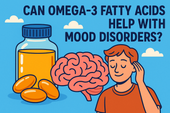
Can Omega-3 Fatty Acids Help with Mood Disorders?
Omega-3 fatty acids do more than support heart health — they can help balance mood, reduce depression, and calm anxiety. Discover how EPA and DHA nourish your brain, fight inflammation, and support emotional well-being from within. 🌊🧠
-

Vitamin D and Mood: The Sunshine Vitamin for Emotional Balance
Could the key to emotional balance be as simple as a little sunlight? Discover how vitamin D — the sunshine vitamin — influences serotonin, reduces inflammation, and helps you feel more positive and resilient year-round. ☀️💛
-

The Role of Magnesium in Reducing Irritability and Low Mood
Feeling on edge or emotionally drained? Magnesium could be the missing link between your body and your mood. Discover how this essential mineral reduces irritability, balances neurotransmitters, and helps your nervous system find calm again. 🌿✨
-
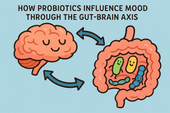
How Probiotics Influence Mood Through the Gut-Brain Axis
Discover how probiotics can do more than support your digestion—they can actually uplift your mood. This article explores the fascinating gut-brain axis and how balancing your gut bacteria through probiotics may help reduce anxiety, improve emotional stability, and support long-term mental well-being. 🌿🧠
-
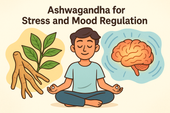
Ashwagandha for Stress and Mood Regulation
Discover how Ashwagandha, the powerful adaptogenic herb 🌿, helps your body manage stress and regulate mood. Learn how it balances cortisol, boosts GABA and serotonin, and supports emotional stability — helping you feel calm, focused, and resilient every day.
-
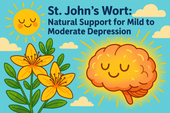
St. John’s Wort: Natural Support for Mild to Moderate Depression
Discover how St. John’s Wort, the “sunshine herb” 🌼, naturally supports mild to moderate depression. Learn how it boosts serotonin, balances mood, and promotes emotional resilience — with research showing its effectiveness compares to antidepressants, but with fewer side effects.
-
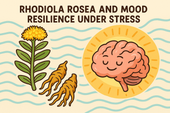
Rhodiola Rosea and Mood Resilience Under Stress
Discover how Rhodiola rosea helps your body adapt to stress 🌿. Learn how this powerful adaptogen balances cortisol, supports serotonin and dopamine, and strengthens emotional resilience — helping you stay calm, focused, and energized under pressure.
-

Chamomile and Lavender: Herbal Calm for Emotional Fluctuations
Discover how chamomile and lavender bring calm to emotional ups and downs 🌿. Learn how these two soothing herbs balance your nervous system, ease anxiety, and support restful sleep — naturally helping you find peace and emotional stability.
-
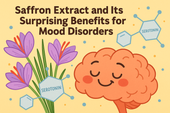
Saffron Extract and Its Surprising Benefits for Mood Disorders
Discover how saffron extract — the golden spice of joy 🌸 — can naturally support mood balance, ease anxiety, and lift mild depression. Learn what science says about its serotonin-boosting power, the ideal dosage, and how this ancient remedy compares to modern antidepressants.
-
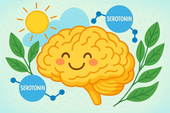
5-HTP and Serotonin: A Natural Path to Lifting Mood
Discover how 5-HTP naturally boosts serotonin 🌞 — the neurotransmitter behind mood, sleep, and emotional balance. Learn how this plant-derived compound supports happiness, reduces anxiety, and improves rest by helping your brain create more serotonin the gentle, natural way.
-
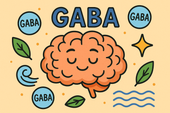
GABA Supplements for Reducing Anxiety and Mood Swings
Discover how GABA supplements can help reduce anxiety and balance mood naturally 🌿. Learn how this calming neurotransmitter works to quiet the mind, ease stress, and improve sleep — plus which nutrients and habits can boost your body’s own GABA production for long-term emotional stability.
-
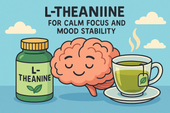
L-Theanine for Calm Focus and Mood Stability
Discover how L-theanine, the calming compound found in green tea 🍵, promotes focus, relaxation, and mood stability. Learn the science behind how it balances neurotransmitters, reduces stress hormones, and enhances clarity — helping you stay centered, calm, and productive without sedation.
-
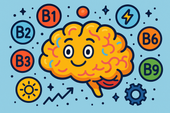
B Vitamins and Brain Chemistry: Supporting Energy and Emotional Balance
Discover how B vitamins power your brain chemistry ⚡. Learn how B6, B9, and B12 support serotonin, dopamine, and energy production — helping boost focus, mood, and emotional balance. From diet to supplements, explore how this vital nutrient group keeps your mind resilient and your energy steady.
-

N-Acetyl Cysteine (NAC) and Mood Disorders: What the Research Says
Learn how N-Acetyl Cysteine (NAC) supports brain health and mood balance 🧠. Discover how this antioxidant helps reduce oxidative stress, regulate glutamate, and improve emotional stability in depression, bipolar disorder, and anxiety — backed by cutting-edge psychiatric research.
-

Supplements for Bipolar Disorder: What May Support Stability
Discover the best supplements for bipolar disorder 🌿 that may support emotional stability and brain health. Learn how nutrients like omega-3s, magnesium, vitamin D, and NAC can help reduce inflammation, balance neurotransmitters, and complement traditional treatment safely.

















































